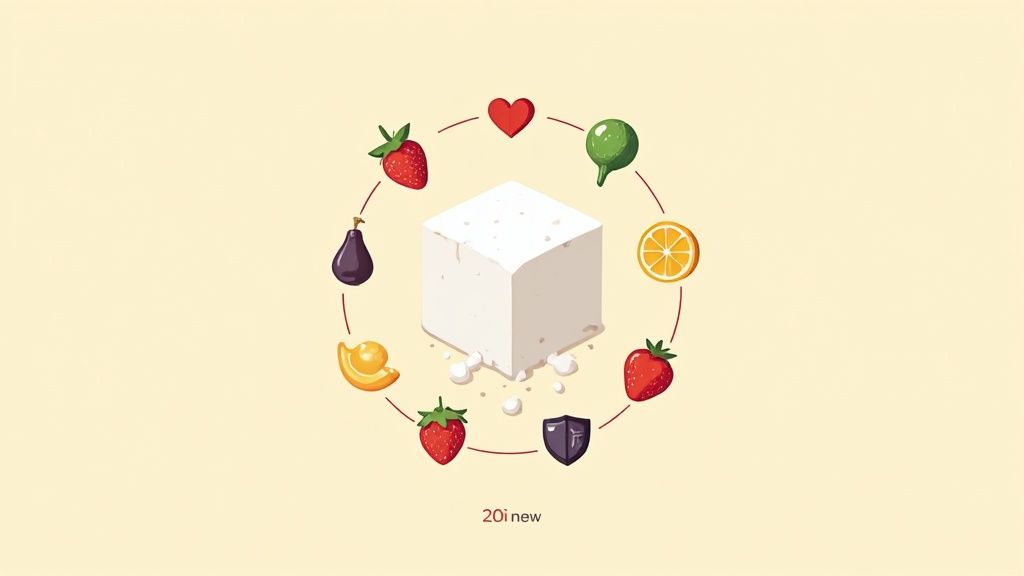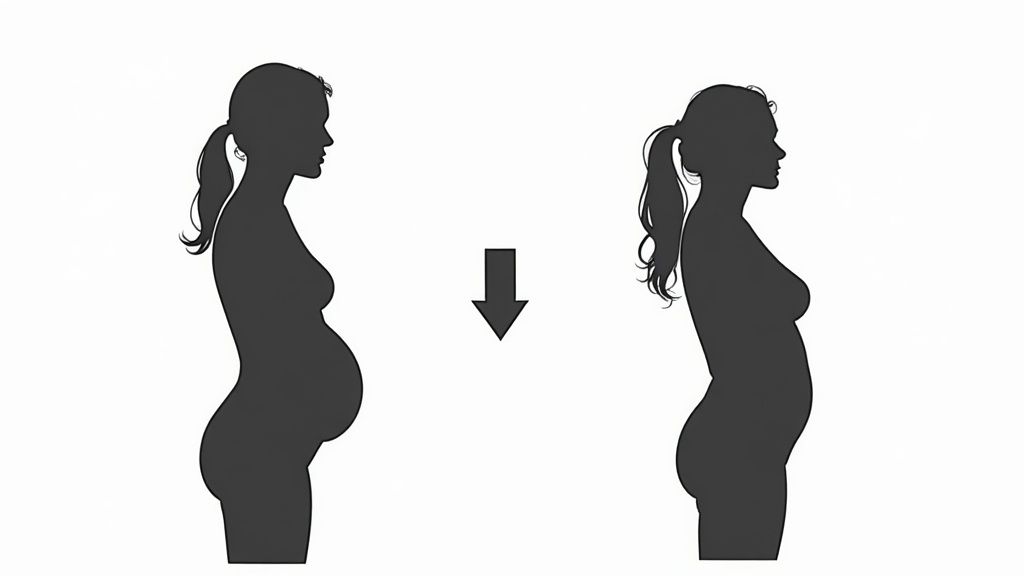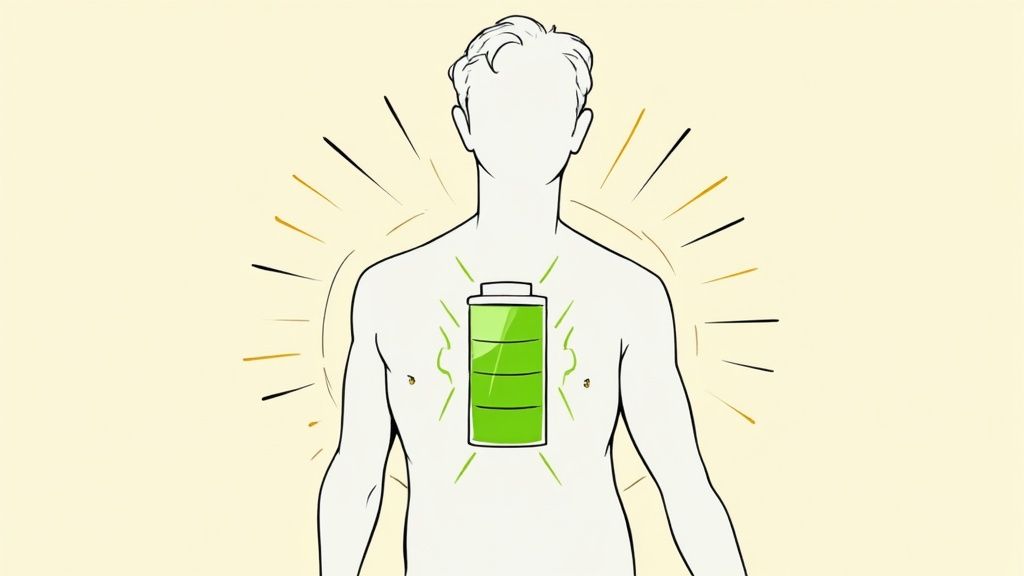8 Amazing Benefits of Stopping Sugar You'll Feel in 2025

We all know sugar tastes good, but its hidden costs can be staggering. From midday energy crashes and persistent brain fog to long-term health risks, excessive sugar consumption quietly impacts nearly every aspect of our well-being. It's often the unseen ingredient driving unwanted weight gain, mood swings, and even skin issues. But what happens when you decide to stop? The transformation can be profound and surprisingly fast, revealing a level of vitality you may not have felt in years.
This article moves beyond generic advice and dives into the specific, evidence-backed benefits of stopping sugar. We will explore eight tangible improvements you can expect, from enhanced mental clarity and stable energy levels to better cardiovascular health and a stronger immune system. Think of this as your clear roadmap to a healthier, more vibrant you. Each point is designed to provide not just the "what" but also the "how," offering actionable steps to help you start your journey today. Get ready to discover the powerful and positive changes that occur when you finally break free from sugar's hold. This one decision could truly unlock a new level of health you didn't think was possible.
1. Weight Loss and Improved Body Composition
One of the most immediate and significant benefits of stopping sugar is its profound impact on weight and body composition. Added sugars are a major source of "empty calories," meaning they provide a high amount of energy with little to no nutritional value like vitamins, minerals, or fiber. When you eliminate these sugars, you naturally reduce your overall caloric intake, creating the deficit needed for weight loss without feeling deprived.

Beyond just calories, cutting out sugar helps stabilize your insulin levels. High sugar consumption causes sharp spikes in insulin, a hormone that signals your body to store fat. By keeping insulin low and stable, your body can more easily access and burn its fat stores for energy, a key factor in improving your body composition. This shift is why many people report losing 10-15 pounds within their first month just by cutting out sugary sodas and desserts.
How to Implement This Change
Making the switch away from sugar doesn't have to be difficult. The goal is to replace sugary items with nutrient-dense alternatives that keep you full and satisfied.
- Swap Your Sips: Replace sugary drinks like soda, juice, and sweetened coffee with water, herbal tea, or sparkling water with a squeeze of lemon or lime.
- Prioritize Protein and Fat: Incorporate healthy fats (avocado, nuts) and lean proteins (chicken, fish, legumes) into every meal. These macronutrients slow digestion and promote satiety, significantly reducing cravings for sugary snacks.
- Rethink Your Sweet Fix: When a craving hits, reach for natural, whole-food options like a handful of berries, a small apple with nut butter, or a piece of dark chocolate (70% cocoa or higher).
- Focus on Fit, Not Just the Scale: Track your progress by how your clothes fit or by taking body measurements. Since you may be building muscle as you lose fat, these metrics can be more encouraging than the number on the scale.
This approach is championed by experts like pediatric endocrinologist Dr. Robert Lustig, who highlights the metabolic damage caused by excessive sugar. It's also a core principle of programs like Whole30, which focuses on whole foods to reset the body's relationship with sugar. By focusing on eliminating added sugars, you not only support weight loss but also build a healthier, more sustainable way of eating.
2. Enhanced Energy Levels and Reduced Fatigue
Another one of the most transformative benefits of stopping sugar is escaping the cycle of energy spikes and crashes. High-sugar foods and drinks cause a rapid rise in blood glucose, providing a temporary burst of energy. However, this is quickly followed by a "crash" as insulin overcompensates, leaving you feeling more tired and sluggish than before. Eliminating added sugar breaks this cycle, leading to stable, sustained energy throughout the day.

When your body isn't on a blood sugar rollercoaster, it becomes more efficient at using its energy stores. Instead of relying on quick glucose hits, it can tap into fat for a more consistent fuel source. This is why so many people, from office workers who no longer experience the 3 PM slump to athletes maintaining steady performance, report a dramatic improvement in their daily vitality after cutting out sugar. Your body learns to maintain its own energy equilibrium without external jolts.
How to Implement This Change
The key to achieving stable energy is fueling your body with the right nutrients at the right times. This approach helps prevent the drastic glucose fluctuations that lead to fatigue.
- Build Balanced Meals: Ensure every meal contains a source of protein (chicken, eggs, lentils), healthy fats (avocado, olive oil), and complex carbohydrates (sweet potatoes, quinoa, vegetables). This combination slows down glucose absorption, providing steady energy.
- Stay Hydrated: Dehydration is a common cause of fatigue. Aim to drink water consistently throughout the day, rather than waiting until you feel thirsty.
- Prioritize Sleep Quality: Stable energy during the day starts with restorative sleep at night. Achieving optimal energy levels also depends on quality rest; consider factors like your sleep environment and even details like choosing the right pillow for better sleep.
- Reduce Sugar Gradually: If you're a heavy sugar consumer, cutting it out cold turkey can lead to withdrawal symptoms like headaches and fatigue. Tapering down slowly can make the transition smoother and more sustainable.
This strategy is championed by functional medicine experts like Dr. Mark Hyman, who emphasizes that food is the most powerful tool for regulating energy. To learn more about other effective strategies, you can explore how to increase your energy levels naturally. By replacing sugar with nutrient-dense foods, you empower your body to generate its own consistent, reliable energy.
3. Improved Cardiovascular Health
Reducing or eliminating added sugar is one of the most powerful changes you can make for your heart. High sugar intake is directly linked to an increased risk of heart disease, as it contributes to several major risk factors, including high blood pressure, elevated LDL ("bad") cholesterol, and chronic inflammation. When you stop eating sugar, you actively reduce the strain on your cardiovascular system.

Excess sugar in the blood can damage the lining of your arteries, leading to inflammation and setting the stage for atherosclerosis, or the hardening of arteries. By cutting out sugar, you lower triglyceride levels, improve your overall cholesterol profile, and help bring your blood pressure down to a healthier range. This is why many people see significant improvements in their cholesterol panels and blood pressure readings just 3-6 months after making the change, sometimes even reducing their need for medication.
How to Implement This Change
Supporting your heart health through diet goes beyond just avoiding sugar; it involves actively choosing foods that protect and strengthen your cardiovascular system.
- Boost Omega-3s: Incorporate heart-healthy fats from sources like salmon, walnuts, chia seeds, and flaxseeds. These fats help reduce inflammation and lower triglycerides.
- Fill Up on Antioxidants: Eat a variety of colorful vegetables and fruits, such as berries, leafy greens, and bell peppers. Antioxidants fight the oxidative stress that can damage blood vessels.
- Monitor Your Progress: Work with your healthcare provider to regularly track your blood pressure and cholesterol levels. Seeing these numbers improve can be a powerful motivator to stick with your new habits.
- Pair Diet with Movement: Combine your sugar-free lifestyle with regular cardiovascular exercise like brisk walking, cycling, or swimming to maximize the benefits for your heart.
This approach is strongly supported by the American Heart Association and cardiologists like Dr. William Davis, author of Wheat Belly, who emphasize dietary changes to reverse heart disease risk factors. Focusing on these benefits of stopping sugar is a proactive step toward long-term cardiovascular wellness.
4. Better Mental Clarity and Cognitive Function
Beyond physical health, reducing sugar intake offers remarkable benefits for your brain, leading to sharper focus and improved cognitive performance. High-sugar diets create a rollercoaster of glucose spikes and crashes, leading to brain fog, poor concentration, and memory lapses. By removing added sugar, you stabilize your blood glucose levels, providing your brain with a steady fuel source for optimal function.

This stability is crucial for neurotransmitter production, the chemical messengers that regulate mood, focus, and memory. Cutting out sugar also reduces chronic inflammation, a factor linked to cognitive decline. Many people experience a significant improvement in mental clarity, with professionals reporting enhanced productivity and students noting better performance on exams after making this change.
How to Implement This Change
Supporting your brain's health while cutting sugar involves adopting habits that promote stable energy and reduce inflammation.
- Boost Brain-Healthy Nutrients: Incorporate foods rich in omega-3 fatty acids (like salmon and walnuts) and antioxidants (found in berries and leafy greens) to protect brain cells and support cognitive function.
- Maintain Consistent Meal Times: Eat balanced meals at regular intervals to prevent blood sugar dips that can cause brain fog and irritability. This helps ensure your brain receives a steady supply of energy throughout the day.
- Prioritize Hydration and Sleep: Dehydration and poor sleep are major culprits behind poor concentration. Aim for at least eight glasses of water per day and 7-9 hours of quality sleep per night for optimal mental performance.
- Manage Stress Effectively: Chronic stress can impair cognitive function. Incorporate stress-management techniques like meditation, deep breathing, or light exercise to support mental clarity and resilience.
This approach is championed by neurologists like Dr. David Perlmutter, author of Grain Brain, who emphasizes the critical link between diet, blood sugar, and brain health. By eliminating sugar, you are not just improving your physical well-being; you are directly investing in a sharper, more focused, and more resilient mind.
5. Reduced Risk of Type 2 Diabetes
One of the most powerful benefits of stopping sugar is the dramatic reduction in your risk of developing type 2 diabetes. Chronic high sugar intake forces your pancreas to work overtime producing insulin to manage blood glucose. Over time, your cells can become resistant to insulin's effects, leading to persistently high blood sugar levels and eventually, type 2 diabetes. By eliminating added sugar, you give your body a much-needed break from this cycle.
Cutting sugar helps improve your body’s insulin sensitivity, allowing your cells to respond more effectively to smaller amounts of the hormone. This lessens the strain on your pancreas and helps stabilize blood sugar levels naturally. This change is crucial for preventing the progression from insulin resistance or prediabetes to a full diabetes diagnosis. Many people with prediabetes have successfully reversed their condition and returned to normal glucose tolerance simply by adopting a low-sugar lifestyle.
How to Implement This Change
Safely lowering your diabetes risk involves replacing high-sugar foods with options that support stable blood sugar. The key is to manage glucose levels without a constant flood of refined carbohydrates.
- Focus on Fiber: Prioritize fiber-rich foods like vegetables, legumes, and whole grains. Fiber slows down the absorption of sugar, preventing the sharp spikes that strain your insulin system.
- Embrace Physical Activity: Incorporate regular exercise, such as walking or strength training, into your routine. Physical activity naturally improves insulin sensitivity, helping your muscles use glucose for energy more efficiently.
- Monitor Your Progress: If you are at high risk or have been diagnosed with prediabetes, monitor your blood glucose levels during your transition. This provides valuable feedback and helps you understand how your body responds to different foods. You can Learn more about the signs and management of prediabetes to take proactive steps.
- Consult a Professional: Always work with a healthcare provider, especially if you are taking medication for blood sugar control. They can help you adjust your treatment plan safely as your body's need for medication may decrease significantly.
This approach is heavily supported by specialists like Dr. Jason Fung, who has demonstrated how dietary changes can reverse type 2 diabetes. By focusing on whole, unprocessed foods and eliminating added sugars, you take a definitive step toward protecting your long-term metabolic health and preventing a serious chronic disease.
6. Healthier Skin and Anti-Aging Effects
One of the most visible benefits of stopping sugar is the dramatic improvement in your skin's health and appearance. Excess sugar in the bloodstream triggers a process called glycation, where sugar molecules attach to proteins like collagen and elastin. This creates harmful compounds known as advanced glycation end products (AGEs), which damage these essential proteins, leading to wrinkles, sagging, and a loss of radiance.
Beyond aging, sugar fuels inflammation and hormonal fluctuations, which are major culprits behind acne breakouts and other inflammatory skin conditions like eczema and psoriasis. By cutting out sugar, you reduce systemic inflammation and help stabilize the hormones that can cause overproduction of oil. Many people report clearer, smoother skin and a reduction in fine lines within weeks of changing their diet, showcasing how closely our skin reflects our internal health.
How to Implement This Change
Supporting your skin's recovery involves both dietary adjustments and a mindful skincare routine. The goal is to nourish your skin from the inside out.
- Hydrate for Detox: Drink plenty of water throughout the day. Proper hydration helps flush out toxins and supports skin cell regeneration, giving you a natural glow.
- Eat Antioxidant-Rich Foods: Incorporate foods high in antioxidants, such as berries, leafy greens, and nuts. These combat the oxidative stress caused by AGEs and protect your skin from damage.
- Rethink Your Skincare: Use gentle, non-comedogenic products that won't clog your pores. Protecting your skin from sun damage with a broad-spectrum SPF is also crucial to prevent further collagen breakdown.
- Focus on Whole Foods: Replace sugary, processed foods with whole foods rich in vitamins and minerals essential for skin health, such as vitamin C (for collagen production) and zinc (for healing).
This approach is championed by skin health experts like naturopathic doctor Dr. Nigma Talib, who links specific dietary habits to visible signs of aging. By removing sugar, you directly address a root cause of premature aging and skin issues, paving the way for a clearer, more youthful complexion. To dive deeper into this topic, you can learn more about the anti-aging benefits of a low-sugar diet.
7. Improved Dental Health
One of the most direct and rewarding benefits of stopping sugar is the dramatic improvement in your dental health. Added sugar is the primary fuel source for harmful bacteria in your mouth, such as Streptococcus mutans. These bacteria consume sugar and produce acid as a byproduct, which erodes tooth enamel, leading to cavities, decay, and sensitivity. By removing their food source, you starve these pathogenic bacteria, creating a healthier oral microbiome.
Beyond cavities, a high-sugar diet contributes to gum inflammation and disease (gingivitis). The acidic environment created by sugar-loving bacteria irritates gum tissue, causing it to become red, swollen, and prone to bleeding. Cutting out sugar reduces this inflammation, helping gums become firmer and healthier. Many people report fewer cavities and a significant reduction in their need for dental fillings after making this dietary change.
How to Implement This Change
Protecting your teeth involves more than just brushing; it requires cutting off the fuel for decay at its source. The goal is to create an oral environment where healthy bacteria can thrive.
- Rethink Your Drinks: Sugary beverages like sodas, juices, and sweetened teas constantly bathe your teeth in sugar and acid. Switch to water, milk, or unsweetened herbal teas to protect your enamel.
- Be a Label Detective: Hidden sugars in processed foods like sauces, crackers, and yogurts are major culprits. Always check the ingredients list for words like sucrose, high-fructose corn syrup, and dextrose.
- Embrace Healthier Sweets: When you need something sweet, opt for natural sugar substitutes like xylitol or stevia, which do not feed harmful mouth bacteria. Whole fruits are also a better choice than processed sweets.
- Double Down on Hygiene: While reducing sugar is key, it works best when combined with excellent oral hygiene. Continue to brush twice daily with fluoride toothpaste and floss regularly to remove any lingering plaque.
This approach is heavily endorsed by dental professionals like Dr. Steven Lin and Dr. Mark Burhenne, who advocate for a diet-based approach to oral health. The American Dental Association also consistently links high sugar consumption to an increased risk of cavities. By focusing on sugar elimination, you are not just preventing problems; you are actively building a stronger, more resilient foundation for lifelong dental wellness.
8. Enhanced Immune System Function
One of the most powerful yet lesser-known benefits of stopping sugar is the significant boost it gives your immune system. Excess sugar consumption promotes chronic, low-grade inflammation, which keeps your immune system constantly on alert and less effective against actual threats. High sugar intake also directly impairs the function of white blood cells, particularly neutrophils, which are your body's first line of defense against bacteria and viruses.
Furthermore, a sugar-rich diet feeds harmful bacteria and yeast in your gut, disrupting the delicate balance of your microbiome, where a large portion of your immune system resides. By cutting out sugar, you reduce inflammation, allow your white blood cells to function at peak capacity, and support a healthy gut environment. This is why many people, from healthcare workers during flu season to families with young children, report getting sick less often after removing processed sugars from their diets.
How to Implement This Change
Strengthening your immune system involves replacing sugar with immune-supportive habits and nutrients.
- Boost with Key Nutrients: Prioritize foods rich in vitamin C (bell peppers, broccoli), zinc (seeds, legumes), and vitamin D (fatty fish, fortified foods). These micronutrients are crucial for producing and activating immune cells.
- Focus on Gut Health: Incorporate probiotic-rich foods like yogurt, kefir, and kimchi into your diet to foster a healthy gut microbiome, which is essential for robust immune function.
- Prioritize Foundational Health: Ensure you get adequate sleep (7-9 hours per night) and manage stress, as both have a direct impact on immune regulation. Chronic stress and sleep deprivation can weaken your defenses, regardless of your diet.
- Stay Hydrated and Active: Drink plenty of water to help your body flush out toxins and maintain regular physical activity to improve circulation and promote the healthy function of immune cells.
This approach is heavily supported by experts like Dr. Andrew Weil and Dr. Rhonda Patrick, who emphasize the connection between diet, inflammation, and immunity. By eliminating a key immune suppressor like sugar, you create a stronger, more resilient defense system capable of protecting you year-round.
Benefits Comparison of 8 Key Sugar-Stop Outcomes
| Benefit | Implementation Complexity 🔄 | Resource Requirements ⚡ | Expected Outcomes 📊 | Ideal Use Cases 💡 | Key Advantages ⭐ |
|---|---|---|---|---|---|
| Weight Loss and Improved Body Composition | Moderate – requires meal planning and label reading | Moderate – focus on sugar elimination, whole foods | Sustainable fat loss, reduced cravings, improved metabolism | Individuals aiming for fat loss and metabolic health | Reduces visceral fat, improves insulin sensitivity, decreases cravings |
| Enhanced Energy Levels and Reduced Fatigue | Moderate – meal timing adjustments recommended | Moderate – balanced meals and hydration needed | Stable, sustained energy without crashes | People experiencing energy slumps, athletes needing endurance | Eliminates energy crashes, reduces caffeine reliance |
| Improved Cardiovascular Health | High – often requires comprehensive lifestyle changes | High – includes exercise, monitoring blood markers | Reduced blood pressure, improved cholesterol, better circulation | Individuals at risk of heart disease or with hypertension | Lowers triglycerides, improves endothelial function |
| Better Mental Clarity and Cognitive Function | Moderate – consistent adherence over weeks | Moderate – diet plus brain-supportive nutrients | Enhanced focus, memory, reduced brain fog | Students, professionals, seniors seeking cognitive boost | Stabilizes neurotransmitters, reduces brain inflammation |
| Reduced Risk of Type 2 Diabetes | High – requires long-term commitment and possible medical supervision | Moderate to high – glucose monitoring and lifestyle changes | Improved insulin sensitivity, reversal of prediabetes | Prediabetic and diabetic individuals | Significantly lowers blood sugar spikes, reduces medication need |
| Healthier Skin and Anti-Aging Effects | Moderate – requires 1-3 months for visible results | Moderate – hydration, antioxidants, skincare | Clearer skin, reduced inflammation, slowed aging | Individuals with acne, premature aging, or skin inflammation | Reduces glycation, improves collagen and skin elasticity |
| Improved Dental Health | Moderate – vigilance for hidden sugars | Low to moderate – dietary and oral hygiene adjustments | Fewer cavities, healthier gums, fresher breath | Children, adults prone to cavities or gum disease | Eliminates cavity-causing bacteria fuel, reduces gum inflammation |
| Enhanced Immune System Function | Moderate – initial detox phase possible | Moderate – diet, supplements, sleep, stress management | Stronger immunity, fewer illnesses, faster recovery | People prone to infections or immune challenges | Improves white blood cell efficiency, reduces systemic inflammation |
Ready to Start Your Sugar-Free Life?
We've explored the incredible and far-reaching benefits of stopping sugar, and the evidence is compelling. From achieving sustainable weight loss and unlocking consistent, vibrant energy to safeguarding your cardiovascular health and sharpening your mental focus, the positive changes are truly transformative. Reducing your sugar intake is not just about avoiding a single ingredient; it's a powerful act of self-care that reclaims your health from the inside out.
The journey away from sugar impacts every part of your well-being. Imagine clearer, more youthful skin, a stronger immune system ready to defend you, and the profound peace of mind that comes from drastically lowering your risk of chronic conditions like type 2 diabetes. Each benefit we've discussed, from improved dental health to better cognitive function, is a building block for a healthier, more fulfilling life.
Your First Steps to a Sugar-Free Future
Feeling inspired is the first step, but turning that inspiration into lasting change requires a clear plan. The key is to start small and build momentum. Don't try to eliminate everything at once. Instead, focus on creating sustainable habits that will carry you forward.
Here are a few actionable steps you can take today:
- Audit Your Pantry: Start by identifying the most obvious sources of added sugar in your kitchen. Read the labels on your favorite cereals, sauces, and snacks. You might be surprised where sugar is hiding. Make a list of these items and plan to replace them with healthier, sugar-free alternatives.
- Rethink Your Drinks: Sugary beverages are often the biggest culprits. Swap out sodas, sweetened juices, and energy drinks for water, herbal tea, or sparkling water with a slice of lemon. If you're a coffee lover, this is a great opportunity to explore new tastes. Instead of sugary syrups, consider adding a dash of cinnamon or trying different milk alternatives for coffee to find a naturally creamy flavor you enjoy.
- Plan Your Meals: Cravings often strike when you're hungry and unprepared. By planning your meals for the week, you ensure you always have a healthy, satisfying option ready. Focus on whole foods like lean proteins, healthy fats, and fiber-rich vegetables to keep you full and stabilize your blood sugar.
Embracing the Journey with Confidence
Remember, this is not about perfection; it’s about progress. There will be challenges, social situations, and moments of temptation. The most important thing is to be kind to yourself and get back on track. Each time you choose a whole food over a sugary treat, you are casting a vote for your long-term health.
The benefits of stopping sugar are not just abstract health concepts; they are tangible improvements you will feel every single day. You are on the brink of discovering a more energetic, focused, and resilient version of yourself. Take that first small step today, and let the journey to a vibrant, sugar-free life begin. You have the knowledge and the power to make it happen.